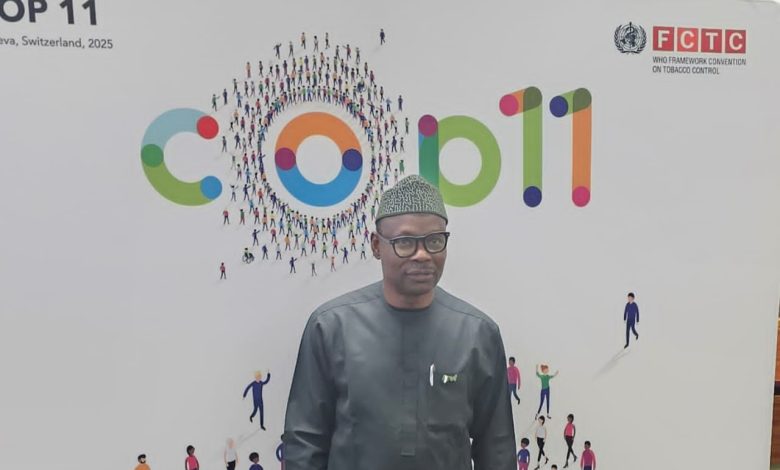Minister Celebrates Nigeria’s Progress in Tobacco Control at COP11, Outlines Future Strategies

Nigeria’s Minister of State for Health and Social Welfare, Dr. Iziaq Salako, has lauded the country’s significant strides in tobacco control since 2012, highlighting its “remarkable progress” in reducing tobacco use and strengthening public health policies. Speaking at the 11th Session of the Conference of Parties (COP11) to the WHO Framework Convention on Tobacco Control (WHO FCTC) in Geneva, Dr. Salako emphasized Nigeria’s commitment to combating the deadly impact of tobacco.
The conference, attended by over 1,400 delegates from around the world, opened with high-level discussions reflecting on two decades of progress under the WHO FCTC. Participants, including representatives from government, international organizations, and civil society groups such as Corporate Accountability and Public Participation Africa (CAPPA), focused on measures to curb tobacco consumption, which claims over 7 million lives annually, and to mitigate the environmental harms caused by tobacco production, use, and waste.
In his keynote address, Dr. Salako highlighted Nigeria’s recent achievements, including the successful completion of the second round of the Global Adult Tobacco Survey (GATS 2025), which indicates a continued decline in daily tobacco use among adults. He also pointed to the positive impact of graphic health warnings, noting that awareness of quitting smoking increased from 26.7% in 2012 to 43.3% in 2025.
“Exposure to secondhand smoke has significantly decreased in homes, workplaces, restaurants, public transport, and educational institutions,” the Minister stated. However, he underscored the importance of maintaining vigilance and enforcing regulations to sustain these gains.
Nigeria has advanced several strategic policies, including the National Tobacco Control Act of 2015, and regulations enacted in 2019. The government’s new strategic frameworks—such as the National Tobacco Control Strategic Plan (2024–2028), Communication Strategy, and Enforcement Plan—are designed to foster a coordinated, multisectoral approach to tobacco regulation and public awareness.
Notably, Nigeria has made significant progress in holding tobacco companies accountable under WHO FCTC Article 19. The Federal Competition and Consumer Protection Commission recently imposed a fine of over $110 million on British American Tobacco Nigeria for violations of tobacco control laws—one of the largest penalties globally—sending a strong message that tobacco industry misconduct will not be tolerated.
Furthermore, Nigeria has introduced new regulations through the National Film and Video Censors Board to ban tobacco advertising, promotion, and sponsorship across media platforms, especially targeting youth exposure and normalization of tobacco use.
Despite these achievements, Dr. Salako acknowledged ongoing challenges, including tobacco industry interference and the proliferation of new nicotine products. He called for stronger international cooperation, technical support, and knowledge exchange to help developing countries counter industry tactics and protect public health.
He concluded by expressing gratitude to WHO FCTC leadership and delegates, emphasizing Nigeria’s ongoing commitment to a tobacco-free future.
In related discussions, a ministerial roundtable organized by Belgium addressed the urgent issue of nicotine addiction among youth, focusing on the marketing of e-cigarettes and novel tobacco products. WHO FCTC officials called for increased global efforts to combat the rising epidemic of nicotine dependency.
Under the theme “20 years of change – uniting generations for a tobacco-free future,” COP11 continues to shape the future of global tobacco control, with subsequent meetings planned to address illicit trade and other pressing issues.


